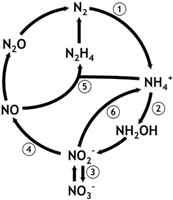Subproject 2 – Microbial N transformation
Impact of altered flooding and crop rotation regimes on microbial communities and activities involved in nitrogen fixation and nitrogen cycling

SP 2 investigates the effects of shifting from flooded to non-flooded cropping on microbial nitrogen cycling in rice-rice or rice-maize rotations. Major processes comprising the N cycle - denitrification, nitrification, biological N2-fixation (BNF) - strongly depend on the redox situation that is likely to change in soil and root environments with altered management regimes. Our data from phase I suggested that conversion of flooded cropping systems strongly affected the composition of the microbiome, particularly in association with roots. Our objectives in ICON Phase II are mainly related to long-term effects and mitigation. To assess long-term changes of rice ecosystem functioning, we will extend our assessment of the effect of aerobic cultivation of rice and crop rotation on activity and community structure of the microorganisms participating in the N-cycle; it can be expected that the soil community in the rhizosphere will also respond in the long run. Additionally, the entire activities and functions of root and rhizosphere microbiome will be analyzed by metatranscriptomics to identify traits specific for the different niches and conditions. Extension of the environmental ranges provided by four study environmentsat On-Farm sites. These additional sites in different climatic areas and with different soils will allow assessing the variation in rice root microbiomes and perhaps identifying a core microbiome of rice (rRNA-based). A new objective in this phase is to understand the impact of cracks on GHG emission and C- and N- losses. Effects of enhanced crack formation on microbial biomass and population structure and consequently nutrient cycling can be expected, particularly at the time of rewetting und thus changing redox potentials, but these subjects have been scarcely studied. Our data will be linked to studies on GHG emission, modelling and nitrogen cycling (SP5, SP7, SP4) and on microbial C-cycling (SP1).
Investigators:
Prof. Dr. Barbara Reinhold-Hurek
Dr. Thomas Hurek
Institution:
General Microbiology
Center for Biomolecular Interactions (CBIB)
University of Bremen
D-28334 Bremen
